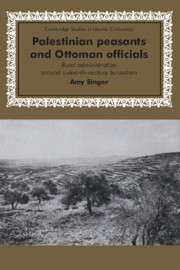Book contents
- Frontmatter
- Contents
- List of maps
- List of tables
- Preface
- Note on transliteration
- Note on money, weights, and measures
- 1 Peasants, Palestine, and the Ottoman Empire
- 2 Aspects of Authority
- 3 The Rules of Local Administration
- 4 Real Accounts and Accounting
- 5 Between Rebellion and Oppression
- 6 Realities and Routines
- Appendices
- Notes
- Bibliography
- Index
5 - Between Rebellion and Oppression
Published online by Cambridge University Press: 03 May 2011
- Frontmatter
- Contents
- List of maps
- List of tables
- Preface
- Note on transliteration
- Note on money, weights, and measures
- 1 Peasants, Palestine, and the Ottoman Empire
- 2 Aspects of Authority
- 3 The Rules of Local Administration
- 4 Real Accounts and Accounting
- 5 Between Rebellion and Oppression
- 6 Realities and Routines
- Appendices
- Notes
- Bibliography
- Index
Summary
Let no one cause any person to become fearful or oppressed contrary to the pristine şer‘iat and the established kanun, so that the re'ay a, forever protected, at ease and repose, may be occupied quietly with their own matters and common labors.
Seasonal routines and the rhythms of agriculture formed the backdrop to the year's activities, providing a common calendar for both officials and peasants despite their different and even opposing agendas. Annual rhythms were predictably interrupted by unanticipated natural crises and disasters. Any common concerns over the vicissitudes of nature, however, were not enough to unite the peasants and Ottoman officials in a harmonious provincial polity. The two groups stood on opposite sides of the tax chest: the peasants filled it while the officials drained its contents. In the normal course of events, the officials spent considerable effort in calling the villagers to account for taxes owing and unpaid, and in bringing them before the kadi to acknowledge (and pay) their debts.
Contacts between officials and peasants were basically defined by fiscal matters. This did not, however, mean that they met only to discuss money. In order to ensure the financial base of the region, officials had to ensure general security, police their own ranks against abuses, contain the discontent of the peasants, oversee routine planting and harvesting, regulate the delivery of basic foodstuffs to Jerusalem and keep the water flowing into the city.
- Type
- Chapter
- Information
- Palestinian Peasants and Ottoman OfficialsRural Administration around Sixteenth-Century Jerusalem, pp. 89 - 118Publisher: Cambridge University PressPrint publication year: 1994



